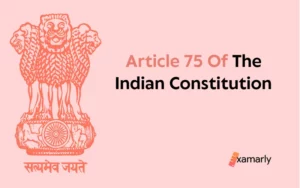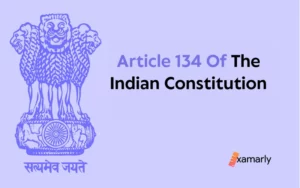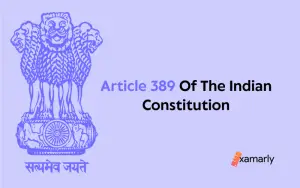The writ of mandamus in India is a legal order issued by a court to a government official or public body, directing them to perform a specific action or duty that is mandated by law.
It is one of the 5 types of writs in India.
Let us dive deep for a complete understanding of the writ of mandamus in India.
- What Is The Writ Of Mandamus In India?
- What Powers Do Courts Have Under Writ Of Mandamus In India?
- Writ Of Mandamus In India – Grounds
- Writ Of Mandamus In India – Purpose
- Writ Of Mandamus In India – Limitations
- Writ Of Mandamus In India – Misuses
- Writ Of Mandamus In India & The Interpretation Of Public Right
- Writ Of Mandamus Exercised In Various Countries
- Noteworthy Judgments On Writ Of Mandamus In India
- Summary
- FAQs About The Writ Of Mandamus In India
- What is the writ of mandamus in India?
- Who can file a writ of mandamus in India?
- What types of acts or duties can be compelled through the writ of mandamus in India?
- What are the limitations on the use of the writ of mandamus in India?
- How long does it take for a writ of mandamus in India to be decided?
- Is the writ of mandamus in India a discretionary remedy?
- What are the consequences of misuse of writ of mandamus in India?
What Is The Writ Of Mandamus In India?
In India, the writ of mandamus is provided for under Article 32 of the Indian Constitution, which guarantees the right to access to justice.
The writ of mandamus is often used to challenge a government body inaction or failure to perform a legal duty, and it can be filed by any person who has been affected by such inaction.
It is considered a “prerogative writ,” meaning that it is issued at the discretion of the court and is not a right that can be claimed as of right.
What Powers Do Courts Have Under Writ Of Mandamus In India?
Courts have the power to issue a writ of mandamus to any government official or public authority, directing them to perform a specific action or public duty that is mandated by law, within their limits of jurisdiction.
A writ of mandamus shall, when issued by a court, bind on the official or authority to whom it is directed and they are required to comply with the court’s order.
The powers of court under writ of mandamus are to direct a public official/authority to:
- Perform a specific duty that is mandated by law.
- Refrain from taking an action that is illegal or violative of fundamental rights.
- Take steps to remedy an existing violation of fundamental rights.
- Take steps to prevent a potential violation of fundamental rights.
- Award compensation to a person who has suffered a violation of their fundamental rights as a result of the actions or inaction.
It should be noted that the writ of mandamus is an extraordinary remedy and should not be used as a substitute for other legal remedies.
The courts have discretion to issue or reject the writ and it should not be issued unless there is a clear legal duty that has been violated by the public official or authority.
Writ Of Mandamus In India – Grounds
The grounds for the issuance of a writ of mandamus in India are as follows:
- The respondent to the writ petition (the government official or public authority) has a legal duty to perform a certain action or refrain from taking a certain action.
- The respondent to the writ petition has failed to perform that duty or has taken an illegal or unconstitutional action.
- The petitioner of the writ petition (the person seeking the writ) has a legal right that is being violated as a result of the respondent’s failure to perform their duty or illegal action.
- The petitioner of the writ petition has exhausted all other available legal remedies and the writ of mandamus is the only way to secure their legal right.
In addition to these general grounds, there are some specific situations where a writ petition of mandamus may be issued, such as when a public official or authority:
- Fails to take action to protect the fundamental rights of citizens.
- Fails to perform a statutory duty or take action as required by law.
- Acts in an arbitrary or discriminatory manner.
- Fails to take action to prevent an imminent harm to the public or the environment.
It is also worth noting that the writ of mandamus should be issued only when there is no other alternative remedy available, and that the writ of mandamus should not be used to enforce private rights.
Writ Of Mandamus In India – Purpose
The primary purpose of the writ of mandamus is to enforce legal duties and to hold public officials and authorities accountable for their actions.
It serves as a legal remedy for individuals and organisations to secure their legal rights and to challenge government inaction or illegal actions.
Some of the specific purposes of the writ of mandamus include:
- To enforce fundamental rights: The writ of mandamus can be used to enforce fundamental rights, such as the right to life, liberty, and equality, and to challenge government actions that violate these rights.
- To hold public officials accountable: The writ of mandamus can be used to hold public officials accountable for their actions and to ensure that they perform their legal duties.
- To remedy government inaction: The writ of mandamus can be used to challenge government inaction or failure to perform a legal duty, and to force government officials to take action to protect the rights of citizens.
- To prevent harm to the public: The writ of mandamus can be used to prevent harm to the public or the environment by directing public officials to take action to prevent such harm.
- To ensure compliance with the law: The writ of mandamus can be used to ensure that public officials and authorities comply with the law, and that they do not act in an arbitrary or discriminatory manner.
- To compensate for the violation of rights: The writ of mandamus can be used to award compensation to individuals who have suffered a violation of their fundamental rights as a result of the actions or inaction of public officials or authorities.
Writ Of Mandamus In India – Limitations
A writ of mandamus is a court order directing a government official or entity to perform a specific act or duty that is required by law.
The limitations of a writ of mandamus include:
- It can only be issued against government officials or entities, not private individuals or organisations.
- The act or duty that is the subject of the writ must be one that is required by law, and the individual or entity against whom the writ is issued must have a clear legal duty to perform the act.
- The writ can only be used to compel an individual or entity to perform a specific act, not to prevent them from taking a specific action.
- The individual or entity against whom the writ is issued must have the ability to perform the act or duty in question, and the writ cannot be used to force them to perform an act that is beyond their authority or power.
- The writ of mandamus is not applicable for discretionary decision making by the government officials, The writ can only be issued if there is no discretion vested with the official to take a decision.
Writ Of Mandamus In India – Misuses
Some examples of potential misuses of the writ of mandamus include:
- Using the writ to force government officials or entities to perform an act that is beyond their legal authority or power.
- Using the writ to compel government officials or entities to perform an act that is not required by law.
- Using the writ to circumvent the normal process or procedures for obtaining a specific act or duty.
- Using the writ to force government officials or entities to perform an act that is discretionary in nature, where the writ is not applicable.
- Using the writ in a manner that is not intended for the benefit of the public but for the personal gain of the petitioner.
- Using the writ to interfere with the normal functioning of government officials or entities, rather than to correct a specific legal wrong.
It is important to note that the writ of mandamus is a discretionary remedy and the courts have the power to decide whether to grant or dismiss the writ.
Misuse of the writ can result in the dismissal of the writ and could also lead to the legal action against the petitioner.
Writ Of Mandamus In India & The Interpretation Of Public Right
A writ of mandamus is a legal order issued by a court compelling a government official or entity to perform a specific act or duty that is required by law.
It is a powerful remedy that allows individuals and organisations to enforce their legal rights when government officials or entities fail to fulfil their legal obligations.
The interpretation of public right refers to the way in which the courts interpret and understand the rights and obligations of government officials and entities in relation to the public.
This can include issues such as access to government services and information, protection of civil rights and liberties, and the accountability of government officials and entities for their actions.
In the context of a writ of mandamus, the interpretation of public right is important because it determines the scope of the writ and the types of acts or duties that can be compelled through its use.
For example, if the courts interpret a particular public right as giving individuals a right to access certain government services or information, then a writ of mandamus may be used to force a government official or entity to provide that access.
The writ of mandamus is an important tool for ensuring that government officials and entities fulfil their legal obligations and respect the rights of the public.
It allows individuals and organisations to hold government officials and entities accountable for their actions, and to ensure that they are acting in the public interest.
Writ Of Mandamus Exercised In Various Countries
In the United States, the writ of mandamus is available as a federal common law remedy under the All Writs Act, and can be used to compel federal officials or entities to perform a duty required by law. It is also available as a remedy under state law in some states, but the specifics can vary.
In India, the writ of mandamus is available under Article 32 and Article 226 of the Indian Constitution.
It can be used to enforce fundamental rights and to compel government officials or entities to perform a duty required by law, such as providing government services or access to information.
In the United Kingdom, the writ of mandamus is no longer in common use, but similar remedies such as judicial review are available to compel government officials or entities to perform a duty required by law.
In Canada, the writ of mandamus is available under the laws of each province, and can be used to compel government officials or entities to perform a duty required by law, such as providing government services or access to information.
In Australia, the writ of mandamus is available under the laws of each state and territory, and can be used to compel government officials or entities to perform a duty required by law.
In general, the writ of mandamus is considered as a powerful remedy to enforce legal rights and to ensure that government officials or entities fulfil their legal obligations and respect the rights of the public.
However, the specific rules and limitations for its use vary depending on the country and jurisdiction.
Noteworthy Judgments On Writ Of Mandamus In India
There have been many noteworthy judgments on writ of mandamus in India, which have established important principles and clarified the scope of the writ.
Some examples include:
- Jarnail Singh vs. Lachhmi Narain Gupta (1992) – This case clarified that the writ of mandamus can be used to enforce fundamental rights and that it is not limited to cases involving statutory rights.
- S.P. Gupta vs. Union of India (1981) – This case established the principle of “public interest litigation” and held that the writ of mandamus can be used to enforce the rights of marginalised or disadvantaged groups who may not have the resources to seek legal redress on their own.
- State of Haryana vs. Ch. Bhajan Lal (1992) – This case established the principle of “promptness” in public administration and held that government officials have a duty to take prompt and timely action on matters that come before them.
- Union of India vs. Association for Democratic Reforms (2002) – This case established the principle that the writ of mandamus can be used to enforce the right to information and to ensure transparency and accountability in government.
- Subhash Kumar vs. State of Bihar (1991) – This case established that the writ of mandamus can be used to enforce the right to a fair trial and to ensure that government officials and entities do not interfere with the administration of justice.
- State of U.P. vs. Raj Narain (1975) – This case established the principle of judicial review over the actions of government officials and held that the courts have the power to review the actions of government officials and to issue writs of mandamus to correct legal wrongs.
These are few examples of the notable judgments, there are many more which have shaped the way writ of mandamus is used in India and have helped to ensure that government officials and entities fulfil their legal obligations and respect the rights of the public.
Summary
The writ of mandamus in India can be used to enforce fundamental rights and to hold public officials accountable for their actions.
It is a powerful legal remedy that can be used to enforce fundamental rights and to hold public officials accountable for their actions.
You Might Also Like To Read: Article 323 Of The Indian Constitution.
FAQs About The Writ Of Mandamus In India
What is the writ of mandamus in India?
The writ of mandamus in India is a legal order issued by a court compelling a government official or entity to perform a specific act or duty that is required by law.
It is a powerful remedy that allows individuals and organisations to enforce their legal rights when government officials or entities fail to fulfil their legal obligations.
Who can file a writ of mandamus in India?
The writ of mandamus in India can be filed by any person or organisation who has been aggrieved by the failure of a government official or entity to perform a specific act or duty that is required by law.
What types of acts or duties can be compelled through the writ of mandamus in India?
The writ of mandamus in India can be used to compel government officials or entities to perform a wide range of acts or duties that are required by law, such as providing government services or access to information, protecting civil rights and liberties, and ensuring accountability for government actions.
What are the limitations on the use of the writ of mandamus in India?
The writ of mandamus in India can only be issued against government officials or entities, not private individuals or organisations.
The act or duty that is the subject of the writ must be one that is required by law, and the individual or entity against whom the writ is issued must have a clear legal duty to perform the act.
The writ can only be used to compel an individual or entity to perform a specific act, not to prevent them from taking a specific action.
How long does it take for a writ of mandamus in India to be decided?
The time frame for a writ of mandamus in India to be decided can vary depending on the complexity of the case and the workload of the court.
In general, the process can take several months to a year or more.
Is the writ of mandamus in India a discretionary remedy?
Yes, the writ of mandamus in India is a discretionary remedy, meaning that the court has the discretion to grant or dismiss the writ.
What are the consequences of misuse of writ of mandamus in India?
Misuse of the writ of mandamus in India can result in the dismissal of the writ and could also lead to the legal action against the petitioner.






